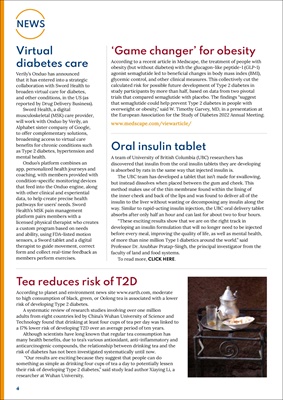
4
NEWS
Virtual
diabetes care
Verily's Onduo has announced
that it has entered into a strategic
collaboration with Sword Health to
broaden virtual care for diabetes,
and other conditions, in the US (as
reported by Drug Delivery Business).
Sword Health, a digital
musculoskeletal (MSK) care provider,
will work with Onduo by Verily, an
Alphabet sister company of Google,
to offer complementary solutions,
broadening access to virtual care
benefits for chronic conditions such
as Type 2 diabetes, hypertension and
mental health.
Onduo's platform combines an
app, personalized health journeys and
coaching, with members provided with
condition-specific monitoring devices
that feed into the Onduo engine, along
with other clinical and experiential
data, to help create precise health
pathways for users' needs. Sword
Health's MSK pain management
platform pairs members with a
licensed physical therapist who creates
a custom program based on needs
and ability, using FDA-listed motion
sensors, a Sword tablet and a digital
therapist to guide movement, correct
form and collect real-time feedback as
members perform exercises.
Tea reduces risk of T2D
According to planet and environment news site www.earth.com, moderate
to high consumption of black, green, or Oolong tea is associated with a lower
risk of developing Type 2 diabetes.
A systematic review of research studies involving over one million
adults from eight countries led by China's Wuhan University of Science and
Technology found that drinking at least four cups of tea per day was linked to
a 17% lower risk of developing T2D over an average period of ten years.
Although scientists have long known that regular tea consumption has
many health benefits, due to tea's various antioxidant, anti-inflammatory and
anticarcinogenic compounds, the relationship between drinking tea and the
risk of diabetes has not been investigated systematically until now.
"Our results are exciting because they suggest that people can do
something as simple as drinking four cups of tea a day to potentially lessen
their risk of developing Type 2 diabetes," said study lead author Xiaying Li, a
researcher at Wuhan University.
'Game changer' for obesity
According to a recent article in Medscape, the treatment of people with
obesity (but without diabetes) with the glucagon-like peptide-1 (GLP-1)
agonist semaglutide led to beneficial changes in body mass index (BMI),
glycemic control, and other clinical measures. This collectively cut the
calculated risk for possible future development of Type 2 diabetes in
study participants by more than half, based on data from two pivotal
trials that compared semaglutide with placebo. The findings "suggest
that semaglutide could help prevent Type 2 diabetes in people with
overweight or obesity," said W. Timothy Garvey, MD, in a presentation at
the European Association for the Study of Diabetes 2022 Annual Meeting.
www.medscape.com/viewarticle/
Oral insulin tablet
A team of University of British Columbia (UBC) researchers has
discovered that insulin from the oral insulin tablets they are developing
is absorbed by rats in the same way that injected insulin is.
The UBC team has developed a tablet that isn't made for swallowing,
but instead dissolves when placed between the gum and cheek. This
method makes use of the thin membrane found within the lining of
the inner cheek and back of the lips and was found to deliver all of the
insulin to the liver without wasting or decomposing any insulin along the
way. Similar to rapid-acting insulin injection, the UBC oral delivery tablet
absorbs after only half an hour and can last for about two to four hours.
"These exciting results show that we are on the right track in
developing an insulin formulation that will no longer need to be injected
before every meal, improving the quality of life, as well as mental health,
of more than nine million Type 1 diabetics around the world." said
Professor Dr. Anubhav Pratap-Singh, the principal investigator from the
faculty of land and food systems.
To read more, CLICK HERE.